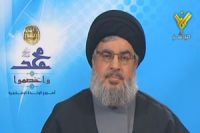 Hezbollah Secretary General: Our Responsibility Is to Inform World about Prophet Mohammad
Hezbollah Secretary General: Our Responsibility Is to Inform World about Prophet Mohammad
Hezbollah Secretary General Sayyed Hasan Nasrallah, stressed that "the Islamic nation should hold its responsibility of working positively to inform the world about the great prophet Mohammad bin Abdullah (PBUH), his life, significance, religion, mission, and words,"
(Ahlul Bayt News Agency) - Hezbollah held Friday night a ceremony on the occasion of Prophet Mohammad's (PBUH) birthday and the week of Islamic Unity which Grand Ayatollah Ruhollah Khomeini originated.
After Koran recitation and chants praising the prophet of Islam, Hezbollah Secretary General Sayyed Hasan Nasrallah delivered a speech in which he tackled a number of regional and internal issues, after speaking about Prophet Mohammad and our duties towards him, especially during this period.
His eminence stressed that "the Islamic nation should hold its responsibility of working positively to inform the world about the great prophet Mohammad bin Abdullah (PBUH), his life, significance, religion, mission, and words," indicating that "the campaign against him is not an individual one, it is rather a student campaign that aims at offending this great man and defaming his religion and mission, and this one of the most important challenges facing the Islamic Ummah."
Sayyed Nasrallah pointed out that "we don’t mind that anyone discusses with us issues related to our ideology and religion, but offenses and curses are not accepted by anyone no matter what the religion he follows was."
Goals behind Offending Prophet Mohammad
Sayyed Nasrallah assured that "some sides that seek tension between Muslims and Christians, or Muslims with each other, were behind the offenses against prophet Mohammad," adding that "one of the challenges we face is seeing the conflicts and divisions in the Arab and Islamic region increase… however, we should be aware that these conflicts don’t have a sectarian background, but rather a political one."
Sayyed on Prophet Mohammad birthdayHis eminence stressed that most of the conflicts that took place in the region throughout history and that are still taking place have political backgrounds not sectarian ones, and they are mainly conflicts over power, giving several examples such as Bani Umayyad and Bani Abbas.
Was the Kuwait, Iraq war a sectarian one or a war over power? Similar was the conflict between Iraq and Iran, which had political reasons, and the evidence is that Shiite soldiers were fighting in the Iraqi army… but today when some politicians want to ignite tension they claim that the Iraqi, Iranian war was a sectarian one between Shiites and Sunnis," he added.
Hezbollah Secretary General emphasized that "we (the Lebanese) must try to approach this reality, because Lebanon is part of this region, and could be one of the countries that are mostly affected by the surroundings… Even though these conflicts have been present in the region all through history, but the greatest misfortune is that we don’t know how to deal with these conflicts."
In this context, his eminence warned that "we could lost control over crises, but if we face these crises responsibly, we could overcome many negativity that could fall."
From here, he hoped that "conflicts be regarded as political not religious ones… as we should avoid sectarian and religious mobilization, and be aware that some could ignite the conflict but cannot stop it or limit it to a certain country."
He also reassured the importance of "committing to dialogue because it is much better than clashing… dialogue is what we call for in all the fields, from Syria to Yemen, Tunisia, Libya, Egypt, Iraq, and Lebanon, as by clashing, we would destroy our people and country while Israel and America are watching."
Israeli Elections
Sayyed Nasrallah highlighted "the significant regression of the leading and establishing parties in the entity, and the absence a strong leading party as well as basic and central leaders… in contrast there were religious and extremist parties, which would complicate the administration and the political decision making in the entity."
" Regarding the Palestinian cause, the Palestinian refugees, and the Arab rights, this does not very between the right and the left in the Israeli entity… Gaza's only guarantee is the powerful resistance… and Lebanon's guarantee is tripartite equation, which is consisted of the army, people and resistance," he further considered.
Internally
As Sayyed Nasrallah indicated that the main issue in Lebanon now is the Parliamentary elections and the electoral law, he pointed out that "a big part of the Lebanese political scene does not include a respectful, objective dialogue, but rather curses and insults, and here it is better to exclude ourselves from such arguments."
His eminence said "the electoral law issue is a sensitive one, and every group or sect in Lebanon might regard it as a sensitive issue due to the situation in the country, as well as the fears and divisions, especially after the regional developments."
"The fears of the Christians are normal, especially after what happened in the region. When the Christians see what happened in Iraq, Syria, and Nigeria, they have the right to be afraid," he added.
Sayyed Nasrallah rejected "some leaderships' claims that the Orthodox proposal is Hezbollah's project," stressing that "we have many choices and projects for elections, and claiming that we adopted the Orthodox law to cancel the elections is absurd."
In this context, his eminence indicated that "the most dangerous weapon in elections is money," adding that "a basic official in the opposing bloc had told me that he payed three billion dollars in the 2009 elections."
In conclusion, Sayyed Nasrallah emphasized the importance of "keeping the door open for dialogue and forgetting about wagering on the situation in Syria… as the Syrian situation has reached a stage where some parts' dreams did not come true."

















